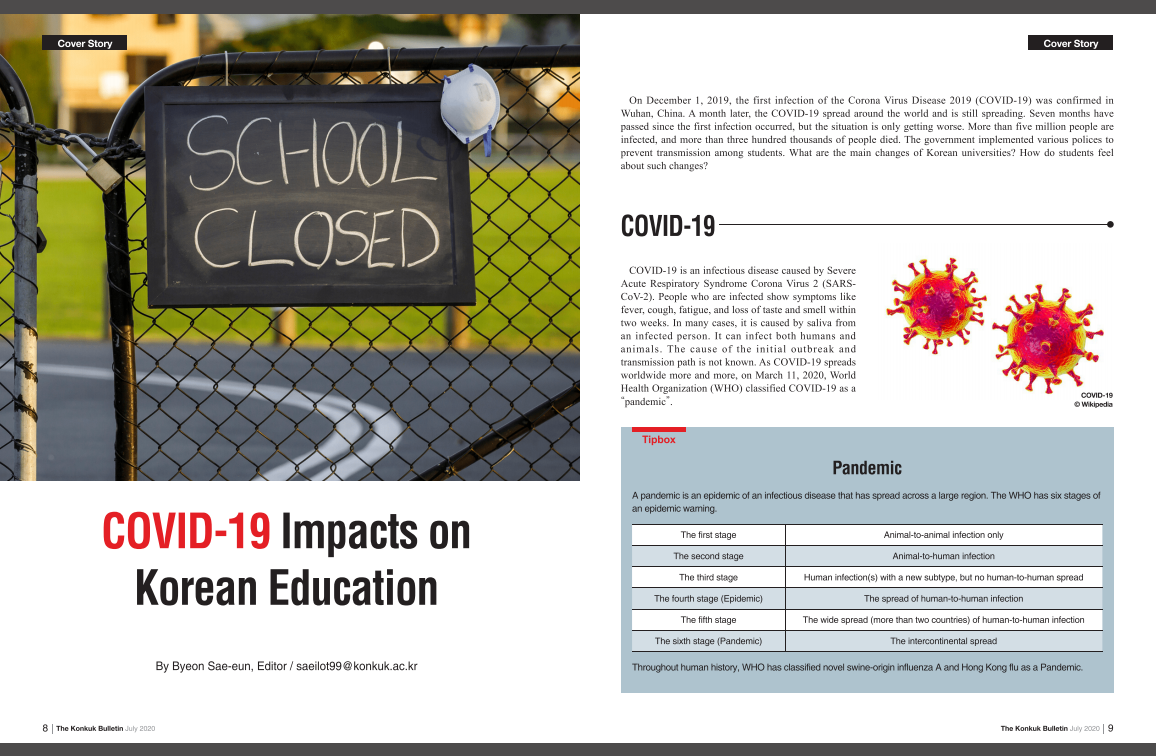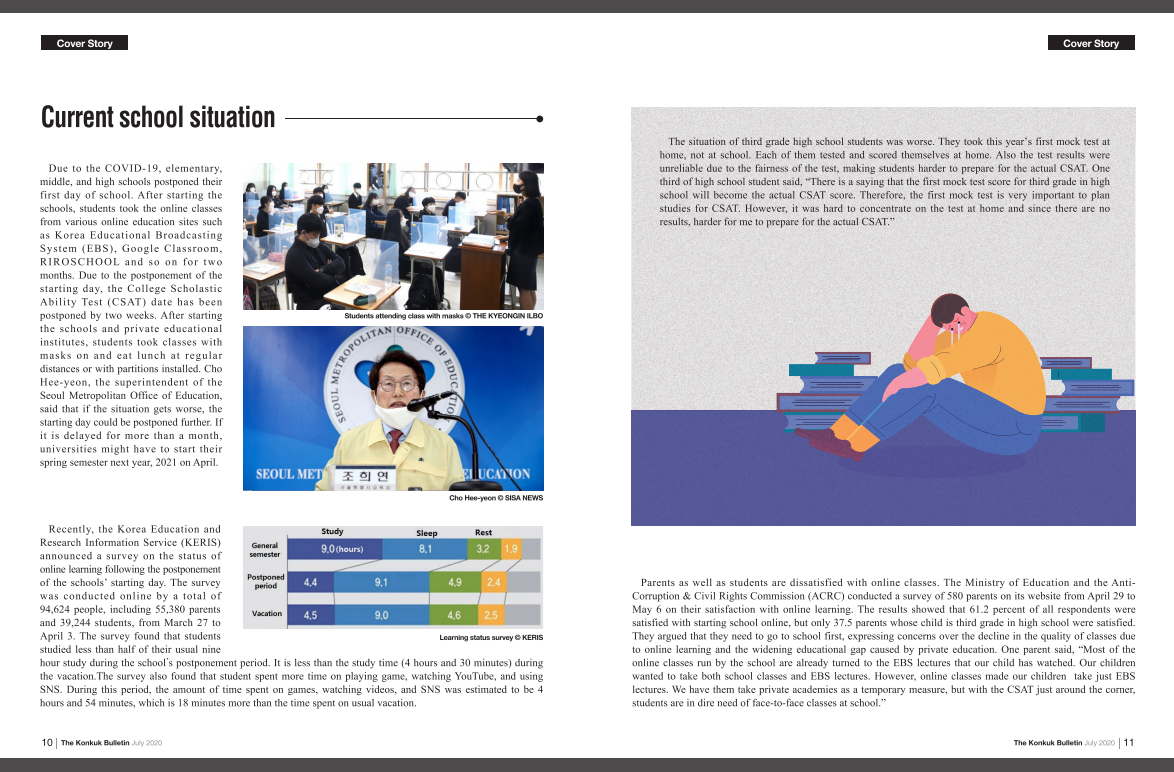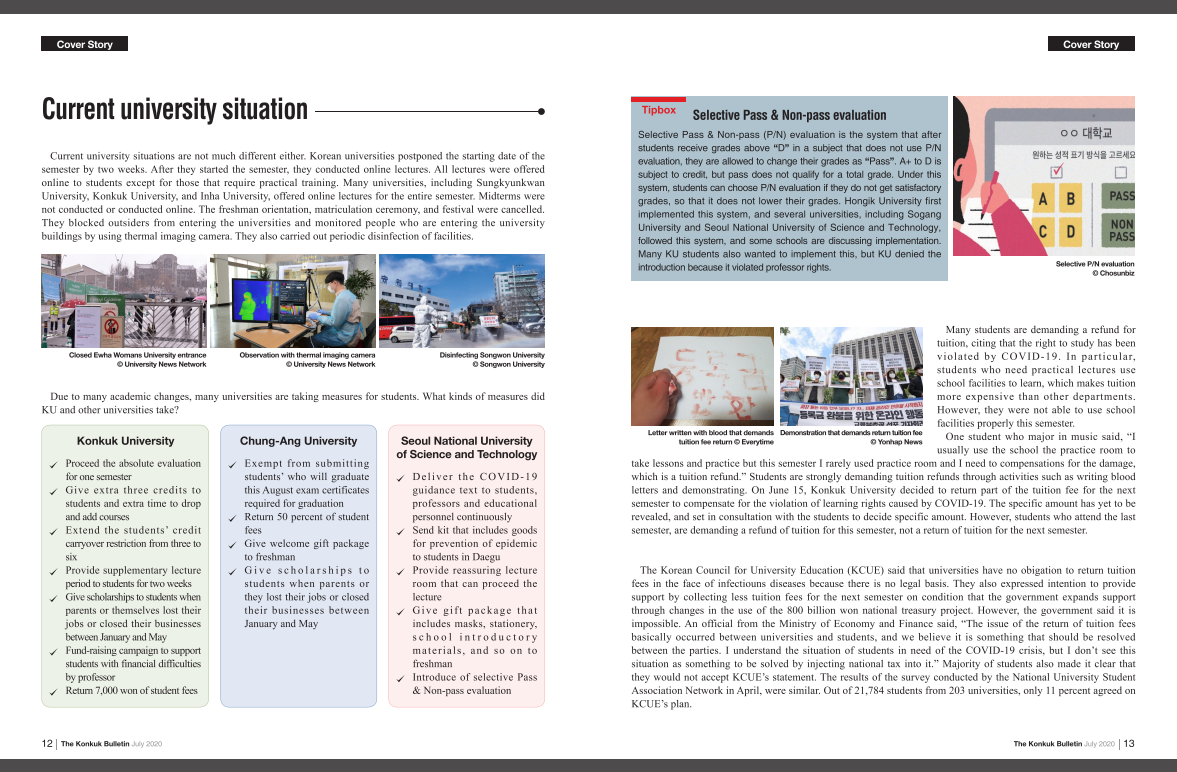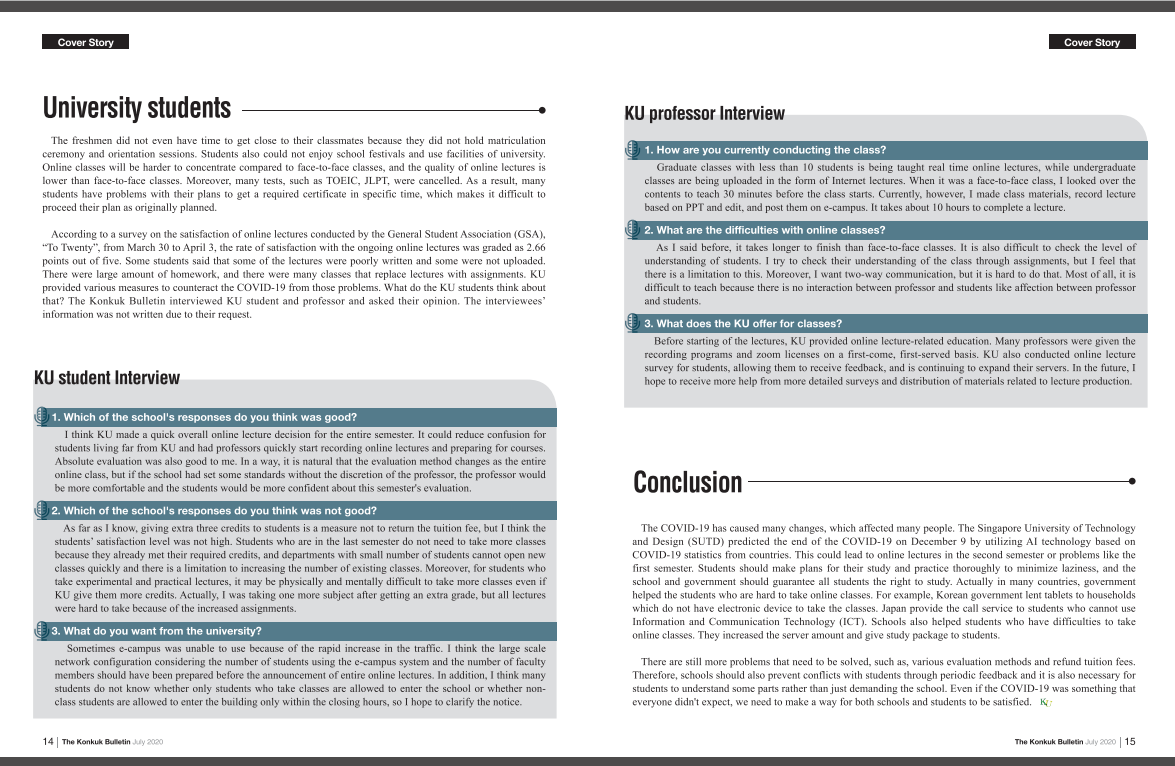



On December 1, 2019, the first infection of the Corona Virus Disease 2019 (COVID-19) was confirmed in Wuhan, China. A month later, the COVID-19 spread around the world and is still spreading. Seven months have passed since the first infection occurred, but the situation is only getting worse. More than five million people are infected, and more than three hundred thousands of people died. The governmentimplemented various polices to
prevent transmission among students. What are the main changes of Korean universities? How do students feel about such changes?
COVID-19
COVID-19 is an infectious disease caused by Severe Acute Respiratory Syndrome Corona Virus 2 (SARSCoV-2).People who are infected show symptoms like fever, cough, fatigue, and loss of taste and smell within two weeks. In many cases, it is caused by saliva from
an infected person. It can infect both humans and animals. The cause of the initial outbreak and transmission path is not known. As COVID-19 spreads worldwide more and more, on March 11, 2020, World Health Organization (WHO) classified COVID-19 as a “pandemic”
Current school situation
Due to the COVID-19, elementary, middle, and high schools postponed their first day of school. After starting the schools, students took the online classes from various online education sites such as Korea Educational Broadcasting System (EBS), Google Classroom,
RIROSCHOOL and so on for two months. Due to the postponement of the starting day, the College Scholastic Ability Test (CSAT) date has been postponed by two weeks. After starting the schools and private educational institutes, students took classes with masks on and eat lunch at regular distances or with partitions installed. Cho Hee-yeon, the superintendent of the Seoul Metropolitan Office of Education, said that if the situation gets worse, the starting day could be postponed further. If it is delayed for more than a month,
universities might have to start their spring semester next year, 2021 on April.
Recently, the Korea Education and Research Information Service (KERIS) announced a survey on the status of online learning following the postponement of the schools’ starting day. The survey was conducted online by a total of 94,624 people, including 55,380 parents and 39,244 students, from March 27 to April 3. The survey found that students studied less than half of their usual nine hour study during the school’s postponement period. It is less than the study time (4 hours and 30 minutes) during the vacation.The survey also found that student spent more time on playing game, watching YouTube, and using SNS. During this period, the amount of time spent on games, watching videos, and SNS was estimated to be 4 hours and 54 minutes, which is 18 minutes more than the time spent on usual vacation.
The situation of third grade high school students was worse. They took this yearʼs first mock test at home, not at school. Each of them tested and scored themselves at home. Also the test results were unreliable due to the fairness of the test, making students harder to prepare for the actual CSAT. One third of high school student said, “There is a saying that the first mock test score for third grade in high school will become the actual CSAT score. Therefore, the first mock test is very important to plan studies for CSAT. However, it was hard to concentrate on the test at home and since there are no results, harder for me to prepare for the actual CSAT.”
Parents as well as students are dissatisfied with online classes. The Ministry of Education and the AntiCorruption& Civil Rights Commission (ACRC) conducted a survey of 580 parents on its website from April 29 to May 6 on their satisfaction with online learning. The results showed that 61.2 percent of all respondents were satisfied with starting school online, but only 37.5 parents whose child is third grade in high school were satisfied. They argued that they need to go to school first, expressing concerns over the decline in the quality of classes due to online learning and the widening educational gap caused by private education. One parent said, “Most of the online classes run by the school are already turned to the EBS lectures that our child has watched. Our children wanted to take both school classes and EBS lectures. However, online classes made our children take just EBS lectures. We have them take private academies as a temporary measure, but with the CSAT just around the corner, students are in dire need of face-to-face classes at school."
Current university situation
Current university situations are not much different either. Korean universities postponed the starting date of the semester by two weeks. After they started the semester, they conducted online lectures. All lectures were offered online to students except for those that require practical training. Many universities, including Sungkyunkwan University, Konkuk University, and Inha University, offered online lectures for the entire semester. Midterms were not conducted or conducted online. The freshman orientation, matriculation ceremony, and festival were cancelled. They blocked outsiders from entering the universities and monitored people who are entering the university buildings by using thermal imaging camera. They also carried out periodic disinfection of facilities.
Due to many academic changes, many universities are taking measures for students. What kinds of measures did KU and other universities take?
Konkuk University
1. Proceed the absolute evaluation for one semester
2. Give extra three credits to students and extra time to drop and add courses
3. Extend the students’ credit carryover restriction from three to six
4. Provide supplementary lecture period to students for two weeks
5. Give scholarships to students when parents or themselves lost their jobs or closed their businesses between January and May
6. Fund-raising campaign to support students with financial difficulties by professor
7. Return 7,000 won of student fees
Chung-Ang University
1.Exempt from submitting students’ who will graduate this August exam certificates required for graduation
2. Return 50 percent of student fees
3. Give welcome gift package to freshman
4. Give scholarships to students when parents or they lost their jobs or closed
their businesses between January and May
Seoul National University of Science and Technology
1. Deliver the COVID-19 guidance text to students, professors and educational personnel continuously
2. Send kit that includes goods for prevention of epidemic to students in Daegu
3. Provide reassuring lecture room that can proceed the lecture
4. Give gift package that includes masks, stationery, school introductory materials, and so on to freshman
5. Introduce of selective Pass & Non-pass evaluation
Tipbox
Selective Pass & Non-pass evaluation
Selective Pass & Non-pass (P/N) evaluation is the system that after students receive grades above “D” in a subject that does not use P/N evaluation, they are allowed to change their grades as “Pass”. A+ to D is subject to credit, but pass does not qualify for a total grade. Under this system, students can choose P/N evaluation if they do not get satisfactory grades, so that it does not lower their grades. Hongik University first implemented this system, and several universities, including Sogang University and Seoul National University of Science and Technology, followed this system, and some schools are discussing implementation. Many KU students also wanted to implement this, but KU denied the introduction because it violated professor rights.
Many students are demanding a refund for tuition, citing that the right to study has been
violated by COVID-19. In particular, students who need practical lectures use school facilities to learn, which makes tuition more expensive than other departments. However, they were not able to use school facilities properly this semester.
One student who major in music said, “I usually use the school the practice room to
take lessons and practice but this semester I rarely used practice room and I need to compensations for the damage, which is a tuition refund.” Students are stronglydemanding tuition refunds through activities such as writing blood letters and demonstrating. On June 15, Konkuk University decided to return part of the tuition fee for the next semester to compensate for the violation of learning rights caused by COVID-19. The specific amount has yet to be revealed, and set in consultation with the students to decide specific amount. However, students who attend the last semester, are demanding a refund of tuition for this semester, not a return of tuition for the next semester.
The Korean Council for University Education (KCUE) said that universities have no obigation to return tuition fees in the face of infectiouns diseases because there is no legal basis. They also expressed intention to provide support by collecting less tuition fees for the next semester on condition that the government expands support through changes in the use of the 800 billion won national treasury project. However, the government said it is impossible. An official from the Ministry of Economy and Finance said, “The issue of the return of tuition fees basically occurred between universities and students, and we believe it is something that should be resolved between the parties. I understand the situation of students in need of the COVID-19 crisis, but I don’t see this situation as something to be solved by injecting national tax into it.” Majority of students also made it clear that they would not accept KCUE’s statement. The results of the survey conducted by the National University Student Association Network in April, were similar. Out of 21,784 students from 203 universities, only 11 percent agreed on KCUE’s plan.
University students
The freshmen did not even have time to get close to their classmates because they did not hold matriculation ceremony and orientation sessions. Students also could not enjoy school festivals and use facilities of university. Online classes will be harder to concentrate compared to face-to-face classes, and the quality of online lectures is lower than face-to-face classes. Moreover, many tests, such as TOEIC, JLPT, were cancelled. As a result, many
students have problems with their plans to get a required certificate in specific time, which makes it difficult to proceed their plan as originally planned.
According to a survey on the satisfaction of online lectures conducted by the General Student Association (GSA), “To Twenty”, from March 30 to April 3, the rate of satisfaction with the ongoing online lectures was graded as 2.66 points out of five. Some students said that some of the lectures were poorly written and some were not uploaded. There were large amount of homework, and there were many classes that replace lectures with assignments. KU provided various measures to counteract the COVID-19 from those problems. What do the KU students think about that? The Konkuk Bulletin interviewed KU student and professor and asked their opinion. The intervieweesʼ information was not written due to their request.
KU student Interview
1. Which of the school's responses do you think was good?
I think KU made a quick overall online lecture decision for the entire semester. It could reduce confusion for students living far from KU and had professors quickly start recording online lectures and preparing for courses. Absolute evaluation was also good to me. In a way, it is natural that the evaluation method changes as the entire online class, but if the school had set some standards without the discretion of the professor, the professorwould
be more comfortable and the students would be more confident about this semester's evaluation.
2. Which of the school's responses do you think was not good?
As far as I know, giving extra three credits to students is a measure not to return the tuition fee, but I think the students’ satisfaction level was not high. Students who are in the last semester do not need to take more classes because they already met their required credits, and departments with small number of students cannot open new classes quickly and there is a limitation to increasing the number of existing classes. Moreover, for students who take experimental and practical lectures, it may be physically and mentally difficult to take more classes even if KU give them more credits. Actually, I was taking one more subject after getting an extra grade, but all lectures were hard to take because of the increased assignments.
3. What do you want from the university?
Sometimes e-campus was unable to use because of the rapid increase in the traffic. I think the large scale network configuration considering the number of students using the e-campus system and the number of faculty members should have been prepared before the announcement of entire online lectures. In addition, I think many students do not know whether only students who take classes are allowed to enter the school or whether nonclassstudents are allowed to enter the building only within the closing hours, so I hope to clarify the notice.
KU professor Interview
1. How are you currently conducting the class?
Graduate classes with less than 10 students is being taught real time online lectures, while undergraduate classes are being uploaded in the form of Internet lectures. When it was a face-to-face class, I looked over the contents to teach 30 minutes before the class starts. Currently, however, I made class materials, record lecture based on PPT and edit, and post them on e-campus. It takes about 10 hours to complete a lecture.
2. What are the difficulties with online classes?
As I said before, it takes longer to finish than face-to-face classes. It is also difficult to check the level of understanding of students. I try to check their understanding of the class through assignments, but I feel that there is a limitation to this. Moreover, I want two-way communication, but it is hard to do that. Most of all, it is difficult to teach because there is no interaction between professor and students like affection between professor
and students.
3. What does the KU offer for classes?
Before starting of the lectures, KU provided online lecture-related education. Many professors were given the recording programs and zoom licenses on a first-come, first-served basis. KU also conducted online lecture survey for students, allowing them to receive feedback, and is continuing to expand their servers. In the future, I hope to receive more help from more detailed surveys and distribution of materials related to lecture production.
Conclusion
The COVID-19 has caused many changes, which affected many people. The Singapore University of Technology and Design (SUTD) predicted the end of the COVID-19 on December 9 by utilizing AI technology based on COVID-19 statistics from countries. This could lead to online lectures in the second semester or problems like the first semester. Students should make plans for their study and practice thoroughly to minimize laziness, and the school and government should guarantee all students the right to study. Actually in many countries, government helped the students who are hard to take online classes. For example, Korean government lent tablets to households which do not have electronic device to take the classes. Japan provide the call service to students who cannot use Information and Communication Technology (ICT). Schools also helped students who have difficulties to take online classes. They increased the server amount and give study package to students.
There are still more problems that need to be solved, such as, various evaluation methods and refund tuition fees. Therefore, schools should also prevent conflicts with students through periodic feedback and it is also necessary for students to understand some parts rather than just demanding the school. Even if the COVID-19 was something that everyone didn't expect, we need to make a way for both schools and students to be satisfied.

